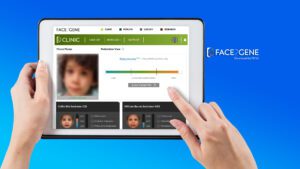
Fetal Fentanyl Syndrome: Unveiling a New Syndrome Linked to Fentanyl Use During Pregnancy
Dr. Karen Gripp, MD, Chief of the Division of Medical Genetics at Nemours Children’s Health in Wilmington, has been at…
May 23, 2016
BARCELONA
“Exome sequencing has a diagnostic rate on the order of 25 to 40 percent, depending on the patient cohort and whether or not a patient had prior testing. Automated facial recognition software may help to increase this yield for disorders that come with facial dysmorphology, according to research presented at the European Society of Human Genetics annual meeting here this week.”
The article describes how FDNA’s Face2Gene technology is set to enhance the diagnostic yield of exome sequencing by integrating facial recognition software with genetic analysis. This innovative approach helps clinicians identify genetic syndromes more accurately by analyzing facial features alongside genetic data. The use of deep phenotyping allows for improved variant prioritization, enabling healthcare providers to make more informed decisions in patient care. With its potential to transform genetic diagnostics, FDNA continues to lead the way in developing advanced solutions for rare and ultra-rare disorders.

Dr. Karen Gripp, MD, Chief of the Division of Medical Genetics at Nemours Children’s Health in Wilmington, has been at…

Dr Giulia Pascolini, an esteemed Italian M.D. and Ph.D., is currently responsible for the Genetic Counselling Service of the Istituto…

Founded in 2017, the Spanish Coffin Siris Syndrome Association is an organization dedicated to supporting families affected by this rare…